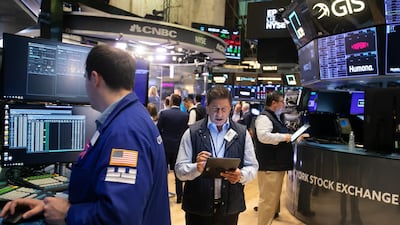Live updates: Follow the latest news on Israel-Gaza
Financial markets remain turbulent amid the Israel-Gaza conflict and rising US bond yields.
The escalation in the Middle East, which is not showing any signs of easing, have riled risk moods, hitting equity markets and higher-yielding asset classes.
Historically, it has been proven that stock markets tend to continue to drop up to 30 days after an initial outbreak of war and, in some cases, the sell-off continues longer.
There have been two trading weeks since the Israel-Gaza war began and the S&P 500 is already back to pre-conflict levels at 4,224 at the time of writing.
This puts the index 1.5 per cent down in October, but still 10 per cent higher on the year.
Tensions in the region will continue to put pressure on gains in equities and other asset classes. Add to this the recent performance of US bond yields and the picture does not look very bright for equity bulls.
Last week, the yield on 10-year US Treasuries rose above 5 per cent, its highest level since 2007, while the yields on two-year Treasuries hit as high as 5.25 per cent.
The rise in US Treasury yields has piled pressure on uncertain equity markets.
Recall that higher yields increase borrowing costs around the world, which tighten monetary conditions.
It is because of these higher yields that the US Federal Reserve has the flexibility to hold rates at the next Federal Open Market Committee meeting on October 31 and November 1.
Speaking last week at the Economic Club of New York, Fed Chairman Jerome Powell hinted that higher yields could persuade the central bank to hit the pause button on rate rises in its continued battle against inflation.
“Higher bond rates are producing tighter financial conditions right now,” Mr Powell said.
Keep an eye out on the yield performance of the 10-year and two-year Treasuries.
This Thursday sees the release of the US gross domestic product reading for the third quarter.
Expectations are for quarter-on-quarter growth of 4.2 per cent, versus a previous reading of 2.1 per cent.
This will be followed by the overall personal consumption expenditure (PCE) price index, the Fed’s preferred measure for inflation.
Due at 4.30pm UAE time on Friday, the overall PCE price index is expected to slow month on month (expect 0.3 per cent versus 0.4 per cent previously) and year-on-year growth is expected at 3.4 per cent versus 3.5 per cent previously.
These figures will be crucial in the lead-up to the FOMC's next meeting.
While there is a 98 per cent chance of a rate hold at this meeting, comments coming from the Fed will be particularly scrutinised.
November 3 will also see the release of October’s US non-farm payrolls report.
Earnings season for the third quarter continues this week. By the time this column is published, tech companies Microsoft and Google would have announced, with Meta and IBM announcing later today. Amazon announces its results tomorrow.
While earnings may beat expectations, I don’t foresee this optimism to overshadow the uncertainty around the Israel-Gaza war and rising bond yields.
Across the pond, the European Central Bank is set to meet and largely leave its rates unchanged.
European bond yields are also peaking and this would help the ECB to hold rates. Their guidance will follow the Fed.
Finally, gold continued its march higher. At the time of writing, the precious metal was 7 per cent higher in October, but eventually stalled in the lead-up to $2,000 a troy ounce.
Those all-time highs of $2,075 would be tested on the upside.
Gaurav Kashyap is a risk manager at Equiti Securities Currencies Brokers. The views and opinions expressed in this article are those of the author and do not reflect the views of Equiti Securities Currencies Brokers


